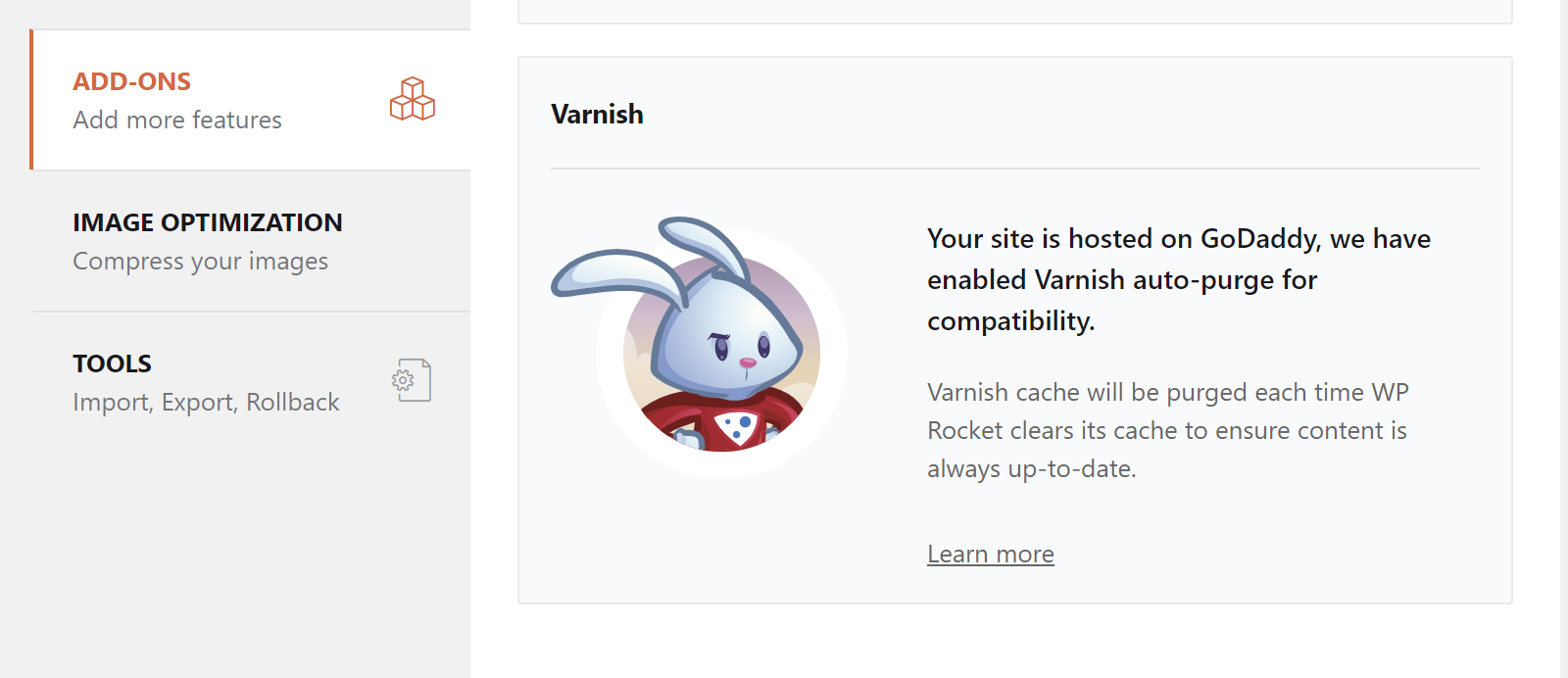- By
GoDaddy offers a popular managed WordPress hosting plan with a variety of WordPress-specific features like staging, automatic updates and…server-level caching.
Because of this server-level caching, GoDaddy bans a lot of WordPress caching plugins on its managed WordPress hosting plans, which you may or may not have already encountered.
However, while they ban most of the popular caching plugins, they notably still allow WP Rocket, which is a popular premium caching and performance plugin.
This poses some questions – if you’re already using GoDaddy’s server-level caching, is there still any reason to use WP Rocket on top since GoDaddy still allows it? Does WP Rocket add new features? Does WP Rocket make a difference to your site’s performance at GoDaddy?
To try and answer those questions, I set up a site on GoDaddy’s managed WordPress hosting and ran some tests. In this post, I’ll share that data with you, and I’ll also share exactly what’s happening when you use WP Rocket with your GoDaddy-hosted WordPress site.
Do You Need WP Rocket with GoDaddy Hosting?
First off, GoDaddy offers multiple plans to host your WordPress site, so we need to be clear exactly what we’re talking about here.
For a WordPress user, the two most popular options are probably GoDaddy’s…
If you’re using the shared hosting plan, GoDaddy does not implement any of its own caching (or other performance optimizations), so WP Rocket is going to be a no-brainer there because you go from zero caching to WP Rocket’s page caching, plus a bunch of other performance tweaks. On shared hosting, going from zero caching to any type of page caching should make a pretty big difference on your site’s page load times.
However, the issue isn’t quite as clear when you talk about GoDaddy’s managed WordPress hosting plans, which offer built-in server-level caching via Varnish. That’s why I’m going to focus on GoDaddy’s managed WordPress hosting in my tests.
Because GoDaddy implements this server-level caching on its managed WordPress hosting plans, they ban most popular WordPress caching plugins, including all the biggies like:
- WP Super Cache
- WP Fastest Cache
- W3 Total Cache
In their words, these plugins are banned because “your Managed WordPress account already has caching built into it.”
One caching plugin that does not show up on that list is WP Rocket, which is kind of the point of this post.
How Does WP Rocket Work With GoDaddy Managed WordPress Hosting?
As I mentioned above, GoDaddy’s managed WordPress hosting plans use Varnish page caching at a server-level, which is why there’s a conflict with most of the popular WordPress caching plugins.
However, WP Rocket has a built-in Varnish cache integration, which lets you connect WP Rocket’s functionality to your Varnish caching.
In fact, if you host your site on GoDaddy’s managed WordPress hosting plans, WP Rocket will automatically detect GoDaddy’s Varnish caching and adjust accordingly:

With this enabled, you’ll be able to purge your Varnish cache using the regular WP Rocket interface, and you’ll also benefit from functionality like WP Rocket automatically purging parts of the cache whenever you update a post.
Beyond the integration with GoDaddy’s server-level caching, you’ll also still benefit from WP Rocket’s other performance-boosting functionality:
- Minification and file optimization – WP Rocket shrinks your site’s code by removing white space and combining files.
- Lazy loading – lazy load your images, videos, and iframes to improve your perceived page load times.
- Database optimization – clean out the junk from your site’s database.
- Render-blocking optimization – fix render-blocking JavaScript and CSS and get Google PageSpeed Insights to stop yelling at you.
- Smaller tweaks – disable emojis, remove query strings, speed up Google Fonts, control the WordPress Heartbeat API, and more.
You can learn more about all the features in our WP Rocket review.
Testing GoDaddy Managed WordPress Hosting Performance With WP Rocket
Ok, so you know that WP Rocket does work with GoDaddy and adds some new features, but are those features actually going to make a difference on your site’s page load times?
To analyze this, I set up a test site on GoDaddy’s cheapest managed WordPress hosting tier and ran some tests on two versions:
- A control site without WP Rocket (just using GoDaddy’s server-level Varnish caching).
- The same site with WP Rocket activated and configured on top of the Varnish caching.
To make this test as realistic as possible, I used a full demo site from the popular Avada theme, as well as some common behind-the-scenes plugins like Yoast SEO. You can see a full screenshot of the demo site here – as you’ll see, there’s a lot going on with it, so it’s a tough test case.
To eliminate inter-test variability, I’ll also use WebPageTest to run nine separate tests for each situation on three separate days (so 27 tests total for each version, though I removed two test runs because of errors).
Let’s look at the raw data and then I’ll put everything together at the end to help you understand…
Day One Results
GoDaddy Managed WordPress Hosting
| Average | Test 1 | Test 2 | Test 3 | Test 4 |
| 3.101 s | 2.824 s | 3.203 s | 3.377 s | 3.047 s |
| Test 5 | Test 6 | Test 7 | Test 8 | Test 9 |
| 2.815 s | 3.344 s | 3.461 s | 3.202 s | 2.641 s |
GoDaddy Managed WordPress Hosting WITH WP Rocket
| Average | Test 1 | Test 2 | Test 3 | Test 4 |
| 3.568 s | 2.769 s | 3.230 s | 4.179 s | 4.570 s |
| Test 5 | Test 6 | Test 7 | Test 8 | Test 9 |
| 5.043 s | 3.207 s | 2.896 s | 2.654 s | Removed |
Day Two Results
GoDaddy Managed WordPress Hosting
| Average | Test 1 | Test 2 | Test 3 | Test 4 |
| 3.289 s | 2.819 s | 3.468 s | 3.296 s | 3.218 s |
| Test 5 | Test 6 | Test 7 | Test 8 | Test 9 |
| 2.636 s | 3.123 s | 4.506 s | 2.881 s | 3.650 s |
GoDaddy Managed WordPress Hosting WITH WP Rocket
| Average | Test 1 | Test 2 | Test 3 | Test 4 |
| 3.317 s | 3.557 s | 2.885 s | 3.091 s | 2.496 s |
| Test 5 | Test 6 | Test 7 | Test 8 | Test 9 |
| 2.527 s | 2.873 s | 2.521 s | 6.490 s | 3.412 s |
Day Three Results
GoDaddy Managed WordPress Hosting
| Average | Test 1 | Test 2 | Test 3 | Test 4 |
| 2.973 s | 3.971 s | Removed | 2.932 s | 3.088 s |
| Test 5 | Test 6 | Test 7 | Test 8 | Test 9 |
| 2.559 s | 2.574 s | 3.143 s | 2.853 s | 2.660 s |
GoDaddy Managed WordPress Hosting WITH WP Rocket
| Average | Test 1 | Test 2 | Test 3 | Test 4 |
| 2.624 s | 2.518 s | 2.774 s | 2.735 s | 2.614 s |
| Test 5 | Test 6 | Test 7 | Test 8 | Test 9 |
| 2.462 s | 2.719 s | 2.691 s | 2.704 s | 2.396 s |
How I Configured WP Rocket
If you’re interested in the actual configuration of WP Rocket for these tests, here’s how I set it up:
- Varnish integration enabled (again, WP Rocket does this by default if it detects you’re using GoDaddy’s managed WordPress hosting).
- Minification enabled for HTML, CSS, and JavaScript.
- Lazy loading.
- Disable emoji and other small tweaks like that.
- Disable the Heartbeat API.
Does Using WP Rocket With GoDaddy Managed WordPress Hosting Make a Difference?
To help make that data easier to visualize, I’ve put all the mean averages from the three separate testing days together:
| Overall | Day 1 | Day 2 | Day 3 | |
| No WP Rocket | 3.121 s | 3.101 | 3.289 | 2.973 |
| With WP Rocket | 3.169 s | 3.568 | 3.317 | 2.624 |
As you can see, the overall averages are within a tiny fraction of a second of each other, though there were some odd spikes that pulled down WP Rocket’s averages. For example, the 5.043 second spike on day one and the 6.490 second spike on day two.
If I were to use the median of each day’s nine test runs instead of the mean average to avoid those issues, here’s how things would shake out over three days:
| Overall* | Day 1 | Day 2 | Day 3 | |
| No WP Rocket | 3.053 s | 3.202 s | 3.296 s | 2.660 s |
| With WP Rocket | 2.739 s | 3.230 s | 2.285 s | 2.704 s |
* The mean average of the three median values for each day.
So when you exclude those outliers, there is actually a notable difference with WP Rocket – about 0.3 seconds. I add this extra analysis because I don’t see how the weird spikes are WP Rocket’s fault, and I feel it’s more likely something off at a server-level.
So in the end, you could see a small performance improvement from using WP Rocket, which makes sense given how WP Rocket integrates with GoDaddy’s existing caching feature and then adds well-established performance improvement techniques like minification, file optimization, and more.
If you want to test things out for yourself, WP Rocket offers a 14-day money-back guarantee. So you can grab a license (starting at $49), test it out on your GoDaddy site, and see if you notice a positive impact on your page load times.
Used/using WP Rocket with GoDaddy managed WordPress hosting? Thoughts?


